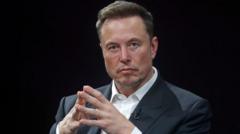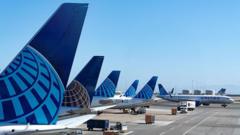**Elon Musk and his company, X, have reached a tentative settlement with former Twitter employees regarding severance payments after mass layoffs, impacting thousands who felt wronged by the company's policy.**
**Musk Settles with Former Twitter Employees Over Severance Dispute**

**Musk Settles with Former Twitter Employees Over Severance Dispute**
**Settlement marks a resolution to the lawsuit filed by ex-employees demanding a substantial severance payout.**
The legal battle between Elon Musk and former Twitter employees appears to be drawing to a close as they have reportedly reached a tentative settlement. The agreement arises from a lawsuit filed by ex-employees who sought $500 million in severance pay after being let go in a wave of layoffs that saw over half of Twitter's workforce dismissed following Musk's acquisition of the platform in late 2022.
The parties involved filed a joint notice with the US appeals court in San Francisco on Wednesday, asking for a postponement of an upcoming hearing to finalize the terms of their settlement agreement. While specific details remain undisclosed, court documents indicate that negotiations are ongoing to formalize the settlement.
In the class-action lawsuit led by former employee Courtney McMillian, claims were made that many of the approximately 6,000 laid-off workers were unfairly denied severance benefits. The group argued that the company had not provided the promised severance packages, which were supposed to offer up to six months’ worth of salaries. Instead, some workers reported receiving only a month’s pay or nothing at all.
The upheaval at Twitter was one of the first major layoffs among technology companies aiming to trim costs in response to changing market conditions and a wider economic slowdown. The tech industry, having ramped up hiring during the pandemic as demand for digital services surged, has faced criticism for the rapid layoffs that followed. Similar patterns of job cuts were witnessed across other tech giants, including Facebook, Google, and Microsoft, all seeking to stabilize their businesses in an evolving economic landscape.
As the tech sector continues to adapt to post-pandemic realities, Musk’s approach, which included significant staff reductions, reflects a controversial strategy to achieve corporate efficiency. Earlier this year, he also made headlines when he cut federal jobs while leading an initiative aimed at reducing government expenditure, further igniting the conversation around corporate and governmental job security.
The continuing developments concerning the X settlement will need judicial sanction before public details of the agreement can emerge. As both parties move toward a resolution, the challenges faced by employees in the tech sector epitomize broader employment issues in times of economic uncertainty, portraying a complex narrative around worker rights and corporate responsibility.
The parties involved filed a joint notice with the US appeals court in San Francisco on Wednesday, asking for a postponement of an upcoming hearing to finalize the terms of their settlement agreement. While specific details remain undisclosed, court documents indicate that negotiations are ongoing to formalize the settlement.
In the class-action lawsuit led by former employee Courtney McMillian, claims were made that many of the approximately 6,000 laid-off workers were unfairly denied severance benefits. The group argued that the company had not provided the promised severance packages, which were supposed to offer up to six months’ worth of salaries. Instead, some workers reported receiving only a month’s pay or nothing at all.
The upheaval at Twitter was one of the first major layoffs among technology companies aiming to trim costs in response to changing market conditions and a wider economic slowdown. The tech industry, having ramped up hiring during the pandemic as demand for digital services surged, has faced criticism for the rapid layoffs that followed. Similar patterns of job cuts were witnessed across other tech giants, including Facebook, Google, and Microsoft, all seeking to stabilize their businesses in an evolving economic landscape.
As the tech sector continues to adapt to post-pandemic realities, Musk’s approach, which included significant staff reductions, reflects a controversial strategy to achieve corporate efficiency. Earlier this year, he also made headlines when he cut federal jobs while leading an initiative aimed at reducing government expenditure, further igniting the conversation around corporate and governmental job security.
The continuing developments concerning the X settlement will need judicial sanction before public details of the agreement can emerge. As both parties move toward a resolution, the challenges faced by employees in the tech sector epitomize broader employment issues in times of economic uncertainty, portraying a complex narrative around worker rights and corporate responsibility.


















